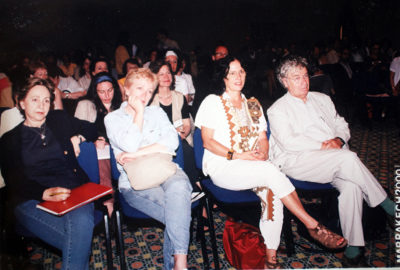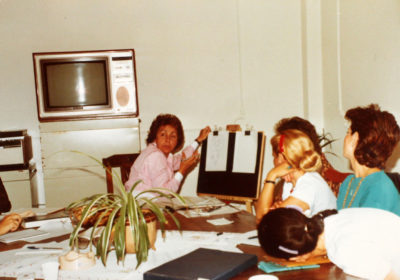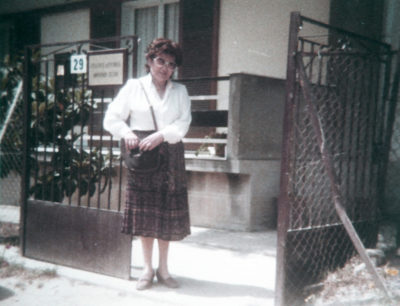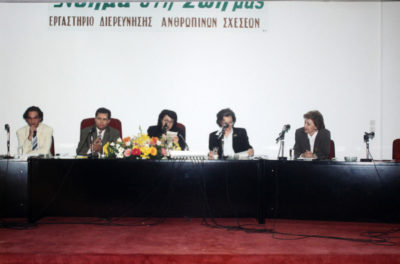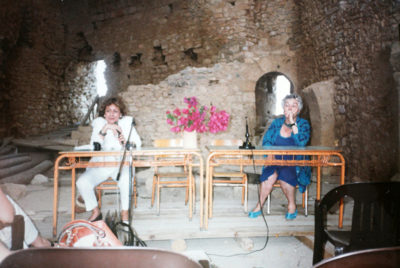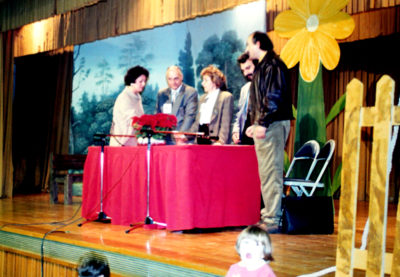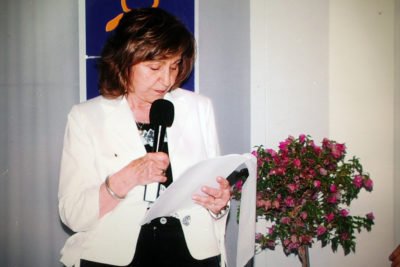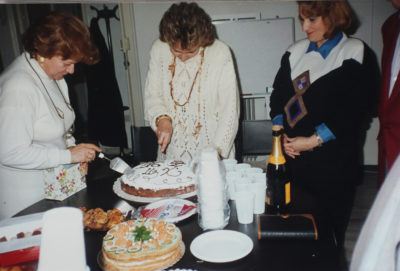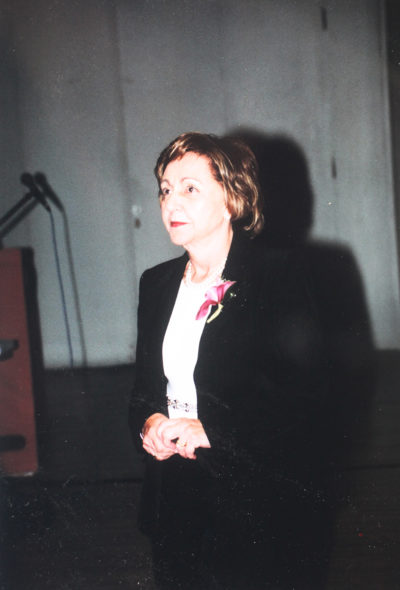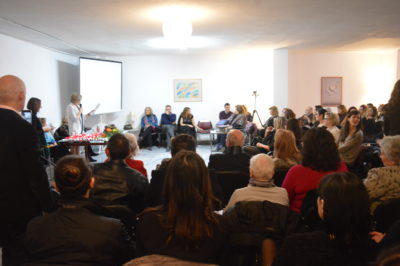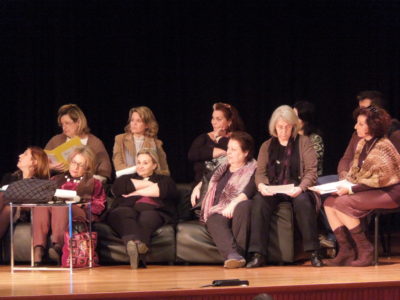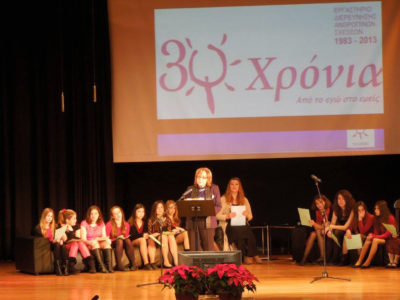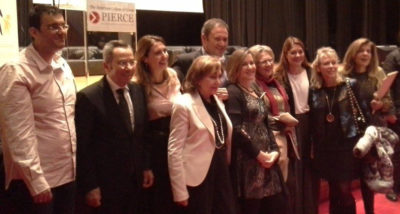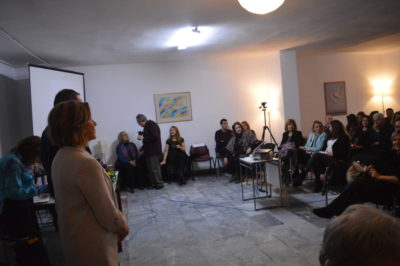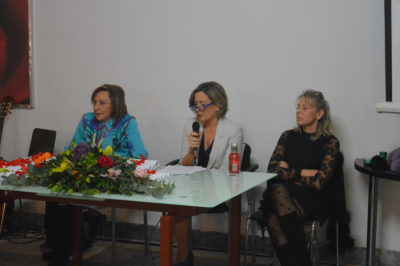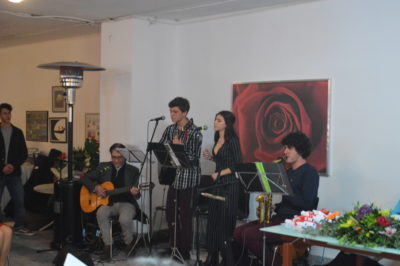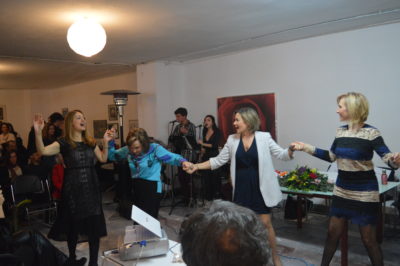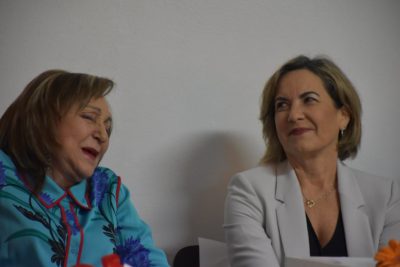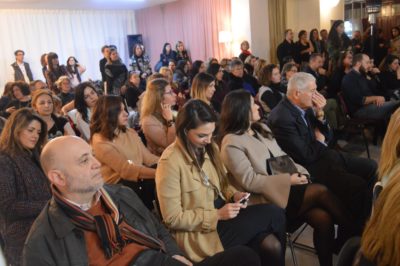Our History
Looking back at all the choices, achievements, crises and transitions that have marked the Laboratory’s history, it is clear that its greatest success and uniqueness lies in being a space open to people and ideas, one that has always welcomed diversity and pluralism, and has grown into a burgeoning hub for creativity, innovation and the personal and professional development of mental health practitioners.
The seeds that it sowed over three decades ago grew into tall and sturdy trees, bearing fruit and producing new seeds that with time spread in all directions and continue to flourish.
At today’s 30-year landmark, the Laboratory constitutes a vibrant network of people and ideas that constantly expands its horizons.
In attempting to provide an overview of the Laboratory’s 30-year journey, we quickly stumbled upon the impossibility of portraying its multifaceted activity in numbers.
Perhaps because its founder Charis Katakis, when leaving the Athenian Institute of Anthropos and her teachers and pioneers of systemic thought George and Vasso Vassiliou, she forged a pathway of openness, committed to building networks of people, ideas and synergies.
How many professionals have trained at the Laboratory to become mental health counsellors and psychotherapists?
How many people have made use of its counselling and psychotherapy services?
How many have attended the workshops, seminars, events and conferences organised within and outside its grounds?
How many have read the more than 30 books in our popular series Human Systems, or the publications and interviews of our associates?
In line with its synthetic approach and outward scope, in its 30-year history, the Laboratory often took the initiative to organise open events with internationally renowned scholars from the field of systemic family therapy and other areas of humanities and social science. Among them have featured Harlene Anderson, Mony Elkaim, Kenneth J. Gergen, Lynn Hoffman, Frank Pittman, Ernest Rossi, Dan Siegel, Robin Skynner, Helm Stierlin, Paul Wachtel.
1983 – 1992 : Taking root and sprouting
The trajectory began prior to 1983, on the street of Irodou Attikou in central Athens. This is where the first group of associates came together and formed the core team that would later set up the Laboratory for the Study of Human Relations. Among the people collaborating with Charis Katakis in those early years were Anna Voulgaraki, Manouela Plataki, Evi Psalti and others, who, three decades later remain involved, in various ways and roles, with the activities of the Laboratory.
In 1983, Charis Katakis and a team from her first cohort of trainees decide to set up the Laboratory for the Study of Human Relations. It consisted of two main divisions: the training of mental health professionals and a clinical service providing counselling and psychotherapy to the public. Charis Katakis herself initially undertook the coordination of the academic component of the training program. Rena Konstantakaki and Gina Moraki engaged exclusively with the clinical service, Tessa Prattou specialized additionally in child and adolescent intervention and in art therapy, and Malvina Tsounaki in therapeutic assessment and diagnosis. Later, Alia Samara also joined the team.
From 1983 to 1989, from its headquarters in an apartment in Chalandri, that first core team of associates sows the seeds that led to the Laboratory’s creative and long-lasting journey. Very soon, around the founding team gather colleagues and trainees who remain close companions of the Laboratory to this day, people like Peggy Athiniotou, Anna Voulgaraki, Eleni Nina, Vivian Griva, Aglaia Kotsaki and Evi Psalti.
The first official teaching team on the Systemic and Family Therapy Training Course was composed of Charis Katakis, Peggy Athiniotou, and Eleni Nina.
Since its inception, the Laboratory has consistently demonstrated its openness and outward scope by organizing or actively participating in seminars and workshops, and by launching the book series Human Systems in collaboration with KEDROS publishing house, through which 9 books were published.
In 1984, Charis Katakis’ first book, The Three Identities of the Greek Family is published and included in the series Human Systems. Today, three decades later, this book remains an integral part of the reading lists of all academic and vocational courses for mental health professionals in Greece.
In 1989, the Laboratory moves to Marousi, in the building where it remained for 28 years, until August 2017.
In 1992, LSHR’s founding members Rena Konstantaki, Gina Moraki, Tessa Prattou and Malvina Tsounaki depart from the Laboratory to spread, each in her own way, the seeds that took root and sprouted inside the Laboratory.
1992 – 1999: Building and Spreading
Peggy Athiniotou and Eleni Nina take over in the clinical and educational sectors, and new colleagues join in, all graduates of LSHR: Marios Kirritopoulos, Katerina Kotsirilou, Maria Pyrounaki-Lyonis, Patrick Thomassin, Smaro Markou, Manolis Tsagarakis and Giorgos Economou.
In 1993, to mark the 10th anniversary since its founding, the LSHR organizes a one-day conference at the amphitheatre of Moraitis School in Athens. The topic of the conference is “Systemic Thought and Mental Health” and the Laboratory’s core associates conduct workshops and presentations.
In 1995, the children and adolescent intervention program is re-opened and directed by Giota Antoniou and Katerina Kotsirilou. Its scope widens to include counselling and psychotherapy groups for adolescents, parent counselling, and training courses for professionals working with children and adolescents with and without learning difficulties.
That same year (1995), Maria Pyrounaki-Lyonis launches the short (one-year or two-year) interdisciplinary courses on Introduction to Systemic Thought and Applications in the Workplace, that remain part of LSHR’s activities to this day.
The book series Human Systems incorporates the systemic children’s tale «The Adventures of Loretta Mouse» by Alex Duve, adapted and translated by Evi Psalti, whose original children’s fables Paramithotragouda are also published through the series. Both works are based on systemic concepts and have inspired theatrical productions, workshops for professionals, and other events.
In 1995, Charis Katakis’ second book The Purple Liquid is published by Ellinika Grammata. In it, she unfolds the two central theories she developed: “The Self-Referential Conceptual System” and the “Stages of Psychotherapy”.
Collaboration with the publishing house ELLINIKA GRAMMATA continues until the company closed in 2010. This partnership saw the publication of many works by Greek and foreign authors, which were subsequently incorporated in the long list of works published under the Laboratory’s Human Systems Series.
In 1996, the Laboratory organises the 8th World Congress of the International Family Therapy Association (IFTA) on “Global Dialogue: Diversity and Unity” in Athens, with satellite symposia in Macedonia, Santorini, and Crete. Once again, the contribution of LSHR’s expanding network of associates through keynote addresses, presentations and workshops is substantial.
That same year (1996), the Greek Organization Against Drugs (OKANA) commissioned the Laboratory to design, organise and implement the “Three-Year Program for the Prevention of Substance Abuse and the Promotion of Health” in the regions of West Attica and Epirus (1996-1999).
Around that time the Laboratory becomes affiliated with the European Family Therapy Association (EFTA) and the International Family Therapy Association (IFTA). Its continuously expanding network of partners and associates is increasingly active in local and international events and conferences.
LSHR’s President Charis Katakis is elected to serve on EFTA’s governing board. She is awarded the title of Approved Supervisor at the founders’ level by the American Association of Marriage and Family Therapy (AAMFT), thereby becoming one of the first certified family therapy supervisors in Europe.
In 1997, Peggy Athiniotou and Eleni Nina withdraw from the Laboratory smoothly and with exemplary professionalism, leaving the rest of the team at the helm until their departure in 1998.
More seeds are transplanted and the spreading continues.
In the coming years, new colleagues join the educational and therapy teams.
In 1998, Charis Katakis takes the initiative to establish the Hellenic Association of Systemic Therapy (HELASYTH) and is elected its first President.
By 1999, the Laboratory has spread and built networks in regions throughout Greece, where its graduates live and work, and abroad.
1998-2010: Growth and Maturity
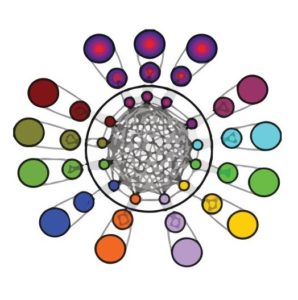
Around the turn of the millennium, directing the Laboratory alongside Charis Katakis are LSHR graduates Athina Androutsopoulou, George Kalarritis, Tsambika Bafiti, and Maria Pyrounaki-Lyonis, surrounded and supported by an ever-expanding family of associates. The team is joined by colleagues who remained until 2010: Christos Ziouvas, Alexis Zotos, Leto Katakis, Giorgos Kissas, Era Moulaki, Giorgos Bogdanis, Irene Reppa, Maria Stamataki, Elena Stolaki, and Nikos Tsamis.
The training programs assume a more academic profile by integrating written coursework and assignments, literature reviews, dissertations and comprehensive study guides, thereby continuing LSHR’s development and diversification, and adapting to the growing demands of our field’s professional associations (EFTA, HELASYTH , EAP, NOPG, EAC and HAC). (Click here for the Study Guides)
To mark the 20th anniversary of LSHR’s founding, a conference is organised in the auditorium of the University of Athens’ School of Philosophy, titled “Healthy Body in a Healthy Mind”. Guest speakers include Dr. Helm Stierlin and associates of the LSHR.
By that time, Charis Katakis has formulated the Integrative Model of Systemic Psychotherapy (SYMOSYTH), which has been incorporated into the LSHR training programs.
In 2004, the four-year training course in Systemic/Family Psychotherapy starts expanding outside of Athens, through the launch of a regional division in Athens, and branches in Thessaloniki (2006-2013) and Patras (2007-2011).
In 2010, the three coordinators of LSHR’s training division in Athens decide to withdraw, thereby continuing to transplant and spread its ideas and vision.
The Laboratory is in dire straits in terms of its finances, is facing a major administrative reshuffle, all the while having to deal with the impact of the economic crisis that by this point has taken the country by storm.
2010-Σήμερα: Strengthening and Returning to Experiential Learning
A change in leadership ensues and an effort to solidify the by now vast network of Laboratory operations, trying to overcome the turbulence brought by the economic crisis that has beset the country.
Leto Katakis, Charis’ daughter, with degrees in Psychology from both Greek and American universities, and over 20 years of research experience in the private sector, takes the helm, at first to steer the Laboratory out of the internal and external crises, and subsequently, to formally succeed Charis as its President. Charis Katakis herself continues to offer her expertise at LSHR, working as trainer and therapist, and is awarded the title of Honorary President.
The new Training Faculty consists of Christos Ziouvas, Maria Pyrounaki, and Elena Stolaki.
The above permanent team of trainers is complemented by Era Moulaki, Giorgos Bogdanis, and Persefoni Spanou, and by regular guest seminars and lectures from Eleni Nina, Giota Antoniou, Maria Stamataki and others, on their respective areas of expertise.
A key goal for the new training team is to achieve the closest possible connection between theory and practice, promoting the hands-on, experiential processing of theoretical concepts and the employment of diverse methods of supervision and practical training.
In 2010, a team of Laboratory associates decided to act collectively in response to the problems caused by the financial crisis, setting up a non-profit, community outreach programme, named Bridges Everywhere. This initiative was led by a small team composed of Charis Katakis, Leonidas Kolettis, Manouela Plataki and Irene Reppa. Around this core group soon gathered many volunteers who helped organise and deliver dozens of free and open events, including conferences, seminars counselling groups and others.
That same year (2010), the publishing house Ellinika Grammata closed down and some of the books from the Human Systems Series were taken up by the publishing house Pedio and reissued.
The summer of 2017 will always hold a special place in the Laboratory’s 35-year history. It was then that we decided to bid farewell to the space that for 28 years had been associated with the Lab’s upward trajectory, and transfer to a new space, one that will continue to make a dynamic contribution to science, society and culture.
For over three decades, the successive restructurings and continuous exchange with individuals, families and wider social groups have broadened our personal and collective horizons.
By this stage, the Laboratory’s network has expanded and created strong ties with organisations, institutions, and processes in the field of mental health and the wider societal context, within and beyond our country’s borders.
Relocating to a spacious, vibrant and functional space on number 3 Aiantos Street, in the heart of Vrilissia, marks a new phase in the Laboratory’s evolving path, as it continues to participate dynamically to our society’s and our culture’s evolution during this time of profound transformations.
The inauguration of our new space took place on Friday, February 2nd, 2018 in an emotional atmosphere. Charis Katakis, speaking of the inauguration, said the following:
The party we organised on Friday, February 2nd to celebrate our new home in Vrilissia, has been one of the highlights of my career. I had the pleasure of sitting next to our President and my daughter, Leto Katakis, who, having taken the helm in 2010, decided to bring us right in the heart of a warm, vibrant and welcoming community such as Vrilissia, enabling us to enjoy daily this comfortable, bright and open space.
Surrounded by loved ones, my children, grandchildren, siblings, nieces and nephews, cousins, fellow teachers, colleagues, trainees, and many friends, I was overjoyed at all that we have accomplished and the anticipation of what is yet to come.
Ultimately, everything I have created over the years has been the outcome of a collective journey; the product of the fruitful interaction between people who share their knowledge and experience to achieve a common purpose and vision. We are truly blessed to be witnessing the warmth, selflessness, and creativity that emerge through synergy, which is the true legacy of the Laboratory.
The Laboratory is a living organism, constantly evolving, transforming and growing. Since its very beginning, it has promoted both the personal and the professional development of its associates. In fact, when it was first founded, to become an associate of the Laboratory one had to maintain their own private practice! At times, it has operated in unconventional ways. This is what led Mony Elkaim to aptly call the Laboratory’s head team a “guerrilla group”, thus highlighting its distinct spirit of autonomy, freedom, and respect for diversity that promotes flexibility, collaboration, and small-group activity.
This is perhaps why the Laboratory maintains its position as a leading training centre in the systemic approach, in Greece and in Europe. All that has remained unchanged for the Laboratory over the years is its vision and values.
Το όραμα μας
The Laboratory is composed, surrounded, and supported by individuals and groups who are deeply committed to promoting the welfare of fellow human beings, a core value that is fully and consistently reflected in their choices and lifestyle.
We at the Laboratory openly and actively encourage individuality and difference, constantly exploring ways in which to promote diversity, pluralism, creativity and growth.
We strongly believe that it is the value we place on interaction and cooperation that makes possible the synthesis of different points of view and the pooling of forces for the achievement of common goals.

Vision
The promotion and dissemination of the systemic perspective in the field of mental health and in Greek society in general.
Mission
The Laboratory for the Study Human Relations is tasked with:
- Providing psychotherapy and counselling services to individuals and families, based on the Integrative Model of Systemic Psychotherapy (“SYMOSYTH”).
- Providing counselling services for the workplace, and for community and professional groups such as mental health and medical professionals, teachers, business executives, administrative & local authorities and others, with the aim of improving communication, relationships and overall quality of life and work, as well as to increase productivity and efficiency.
- Offering professional training in systemic therapy or systemic counselling to psychologists, psychiatrists, social workers, special needs practitioners, lawyers, doctors and other professionals.
- Conducting scientific research programs aimed at deepening our understanding of psychosocial processes in general, and of issues pertaining to psychotherapy and counselling in particular.
- Disseminating systemic thought among scientists, specialists, and the general public by writing, translating and publishing key books and articles, and organizing events such as seminars, workshops, conferences and others.

